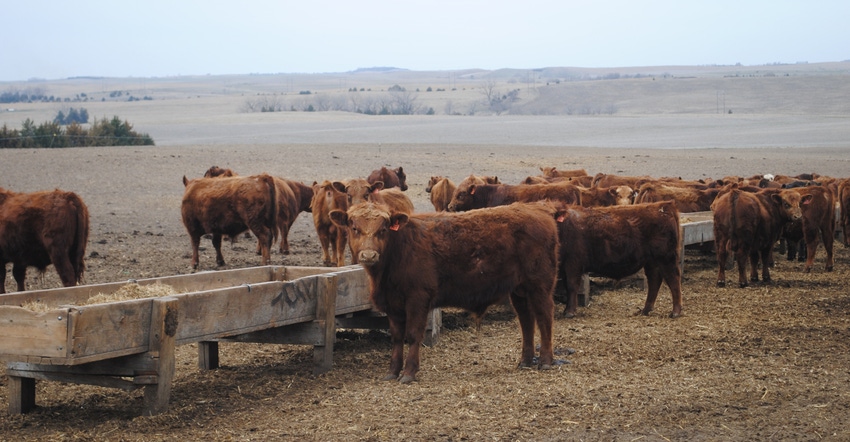
When you remember that your battery of bulls contributes half of the genetics to your cow herd, it drives home the importance of bull fertility.
Winter is a time of risk for bull health and fertility, so management of the bulls during this time is crucial, said Kacie McCarthy, Nebraska Extension beef cow-calf specialist. McCarthy discussed winter care for bulls during a recent University of Nebraska BeefWatch webinar.
“Bulls are highly utilized, with 87% of operations using bulls as their primary breeding method, according to 2009 statistics from a USDA National Animal Health Monitoring System survey,” McCarthy said. “The bull workload during breeding season can range anywhere from four to 80 females.”
In addition, bulls can lose between 200 and 400 pounds during the breeding season, so they need to regain that weight — targeting a body condition score (BCS) of 5 to 6 — to prepare for the subsequent season.
McCarthy said that it isn’t uncommon for hardworking, dominant bulls to drop one or two BCS, depending on their age and maturity. She suggested taking special care of young bulls in the battery, because yearling bulls are still growing and will need to gain between 1.5 to 2 pounds per day to reach about 75% of their mature body weight by the next breeding season — and gain any weight back that they lost in their first breeding season.
Separate young bulls
“Once the breeding season is finished, in the postseason you want to group your bulls and separate the younger or thin bulls from the mature bulls, to help the young ones continue to gain,” McCarthy said. “You can turn them into a separate pasture and provide a good mineral program to help with growth and performance.”
McCarthy recommended paying close attention to selenium, which plays a key role in spermatogenesis, as well as zinc, which also plays a role in male fertility and is critical for sperm cell plasma membrane integrity. In addition, iodine can be added to alleviate any foot rot.
It also is easy to forget that the availability of fresh water is just as important for all bulls in the herd during the winter as it is in summer. Most sources say that a bull weighing 1,400 pounds or more will need at least 9 gallons of water daily at temperatures of 40 degrees F or less.
“The opportunity comes in the end of summer grazing and into winter grazing,” McCarthy said. “We have the opportunity here to use some of our resources like distillers grains and corn residue for winter grazing to help the bulls put condition back on before breeding season.
“The target for yearling bulls would be to gain 200 pounds and be at least 75% of their mature body weight before the next breeding season.”
Beating cold weather
“Cold weather impacts fertility,” McCarthy said. “Cold weather and windchill can result in infertility in bulls because of potential damage to scrotal tissue. It can cause blisters and scabs from frostbite.”
If there is tissue damage, spermatogenesis can take upward of 61 days to regenerate sperm cells for the next breeding season, she said. “The bulls should be reevaluated at least 45 to 60 days before bull turnout,” McCarthy noted. “That will be able to tell us a lot as far as semen quality.”
The impact from frostbite can range from mild to severe. So, offer good cold weather protection, with plenty of space, shelter, windbreaks and bedding to help protect the bulls from the frozen ground.
“Windbreaks help stop the wind and get the bulls out of the extreme conditions,” McCarthy said. “Think about adding bedding to the pens for dry cover, so we make sure the scrotums are not freezing and the bulls can maintain body heat.”
Learn more by contacting McCarthy at [email protected]. Producers can view past topics and register for upcoming webinars at beef.unl.edu.
About the Author(s)
You May Also Like






